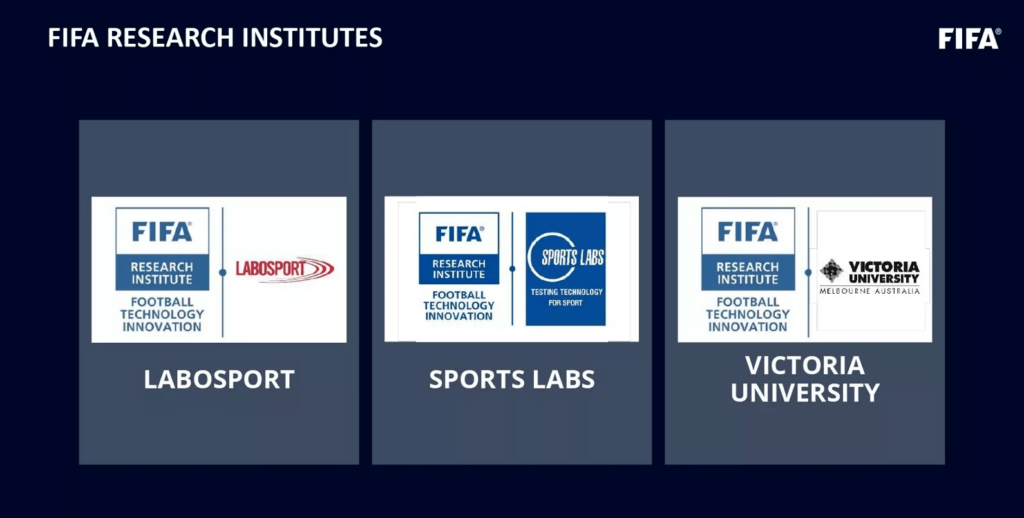Labosport is a FIFA Research Institute:
- FIFA Research Institutes increase their continued support for the Football Technology & Innovation subdivision
- Projects spanning across the FIFA Research, Quality and Innovation Programmes as well the Football Technology team
- Applications to become a FIFA Research Institute will be received every two years with each institute required to meet a defined eligibility criteria and agreed provision to the publication of work in scientific journals
At the recent FIFA Quality Programme Conference and Research Symposium, Labosport, Sports Labs and Victoria University were announced as the first FIFA Research Institutes for Football Technology Innovation. This marks the long-term formalisation of FIFA’s collaboration with these three thought-leading research institutes, seeking to further increase the application of science in football.
Research is central to all the key activities within the FIFA’s Football Technology & Innovation sub-division, playing a vital role in exploring, validating and implementing a variety of products, surfaces, technologies and innovations. Through joint projects, particularly in the last decade, FIFA has built relationships with these institutions and their contribution to football technology is apparent through a number of global standards and scientific publications.

There are many challenges which face the industry and require FIFA’s input, from the democratisation of technology, to new legislation, sustainability and much more.
The expertise of the FIFA Research Institutes will be harnessed in three key areas:
- An agreed amount of technical and human resources made available for the duration of the term, to be allocated to relevant research areas within the FIFA Football Technology & Innovation subdivision.
- Benefitting the wider sports research community by committing to publish their findings in peer-reviewed journals.
- Providing empirical evidence to guide the discussions within the FIFA Quality Programme’s Technical Advisory Groups (TAG), which develops the testing standards and requirements for each product category.The three FIFA Research Institutes are known to many but are introduced below:
Labosport have worked closely with FIFA since the inception of the Quality Programme for Football Turf in 2001. Throughout this time, Labosport have tested products and field installations around the world, and their research and innovation has helped to bring new test methods and standards to the FIFA Quality Programme.
In addition to playing surfaces, Labosport are also involved in other FIFA Quality Programmes such as Goal-line Technology, Futsal Surfaces and the FIFA Quality Programme for Football Goals. Labosport’s core contribution as a FIFA Research Institute will be to accelerate numerous projects to better understand playing surfaces (both natural and synthetic), and to translate this knowledge into new test methods and standards.
Sports Labs’ collaboration with FIFA started in 2005 with a relationship that utilised their expertise in testing surfaces and a variety of different sporting equipment. Since then, as a FIFA Accredited Test Institute in 7 different quality programmes that include everything from playing surfaces to wearable technologies, Sports Labs has become a core contributor to the Research and Standards team.
Whilst one of their key strengths is in understanding the interaction between the player and the surface, their diverse experience across the majority of the FIFA Quality Programmes puts them in a strong position to develop new test methods across the board. Examples range from adapting existing test methods for new offside technologies to developing new measurement techniques for the quality of footballs.
Victoria University (VU) first worked with FIFA in 2016 carrying out fundamental research to establish the feasibility of a standard to assess the accuracy of Electronic Performance Tracking Systems (EPTS). This early research led FIFA to develop and refine a test protocol, which has now assessed over 40 different tracking systems.
VU, a FIFA Accredited Test Institute for EPTS, has recently expanded its EPTS testing to include tracking provided from broadcast video (FIFA Basic), and skeletal tracking used for applications such as semi-automated offside technology.
VU and FIFA will continue to collaborate to generate further knowledge on how technologies can be assessed beyond measuring accuracy and how they can be best understood to help improve the game.
In order to become a FIFA Research Institute a series of eligibility criteria must be met.
- 5 years collaboration with the Football Technology & Innovation subdivision
- Allocation of set amount of research resources to agreed FIFA research projects
- Minimum of 5 scientific publications pre-application with dedicated resources to publication through their term as a FIFA Research Institute
- Demonstrable interdisciplinary research skillsThe application period for new FIFA Research Institutes will be open every two years with the next application period taking place from May – August 2024. This initiative offers a great opportunity to maximise the research resources available to FIFA whilst contributing to real world challenges in collaboration with the industry and academia.







